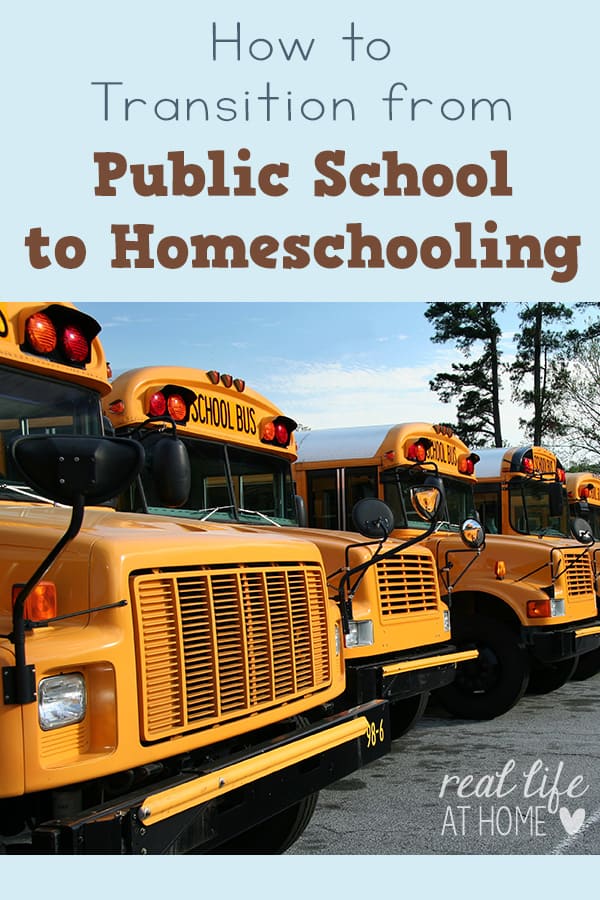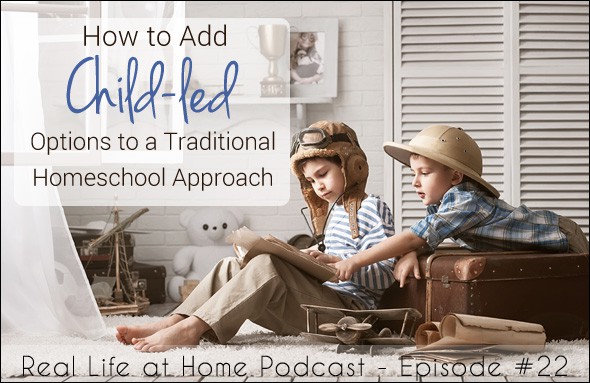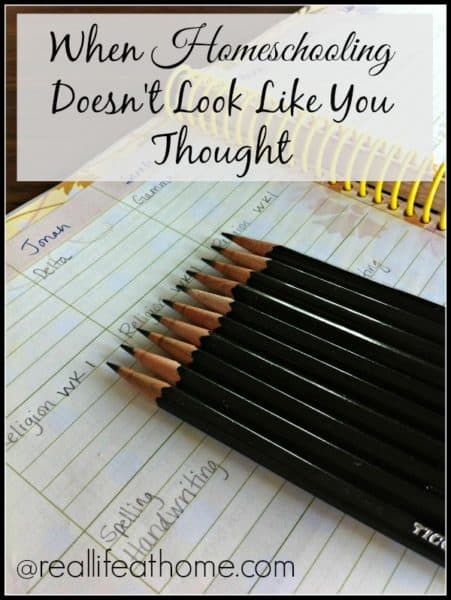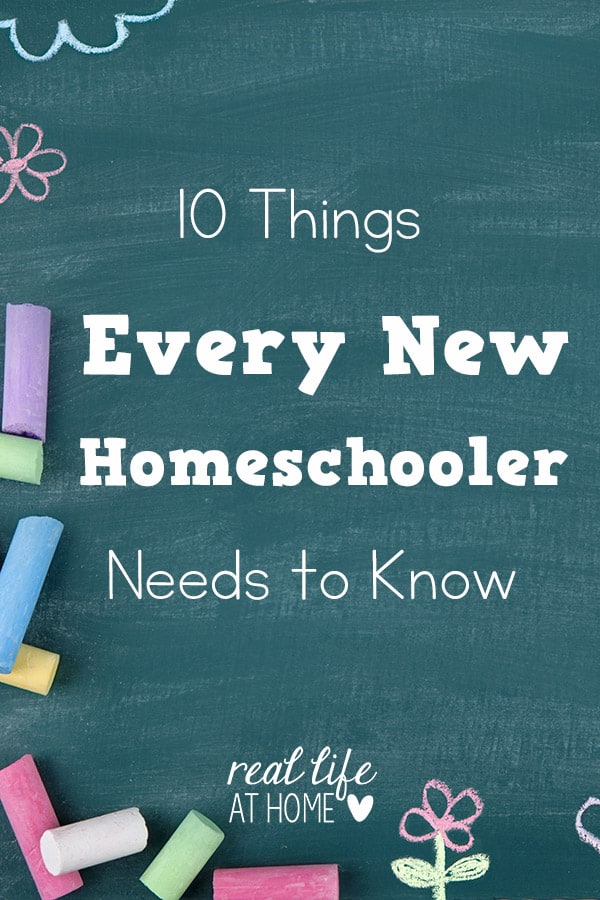advertisement
How to Transition from Public School to Homeschool: 10 Do’s and Don’ts is a post from Kris of Weird, Unsocialized Homeschoolers.
Right now many of you are where I once was – you’re at the beginning of your family’s homeschool journey, preparing to homeschool, rather than return to public school in the fall. It’s a scary, exhilarating time, filled with hopes, doubts, and endless possibilities. Let me offer you ten tips I wish someone had offered me back when we were doing our transition from public school to homeschool.
advertisement
How to Transition from Public School to Homeschool: 10 Do’s and Don’ts
1. Do take a little extra summer break.
My daughter was excited about homeschooling when we started, but she (along with her mother!) was also a bit apprehensive. I decided to offset those doubts and fears with some positive excitement in the form of an extra week or two of summer break.
I am now a huge fan of year round homeschooling, but this extra time served both to allow us a little extra time for deschooling (What is Deschooling and Is It Important?) and to immediately demonstrate one of the big benefits of homeschooling – flexibility.
Learn More: 6 Reasons We Homeschool Year Round
2. Do give yourself time to adjust.
Homeschooling is about much more than where your child is educated – it’s a lifestyle. As such, it does take some time to adjust and find your groove.
Don’t expect everything to go perfectly right out of the gate. Realize that you and your child are adjusting to a different lifestyle and different roles. She is adjusting to you as her teacher and you are adjusting to her as your student.
3. Do maintain friendships.
Your child is most likely going to miss his public school friends. Make an effort to maintain those friendships by arranging play dates and staying in contact with parents. Those first few months can be a bit lonely for both of you, so be sure that you also make an effort to get involved in your local homeschool community so that you and your child have an opportunity to make homeschooled friends.
Learn More: How to Cultivate Friendships as a Homeschool Mom
4. Do take your child’s input on your curriculum and your schedule.
Two of the biggest benefits to homeschooling are a customized education and flexibility. Listen to what your child has to say about the curriculum you’re using, your learning environment, and the order in which you tackle his daily school subjects. Allow him to take ownership of his education rediscover his natural curiosity and love of learning.
5. Do tweak your schedule to fit your family’s schedule and rhythms.
Nothing says that learning only happens Monday through Friday between the hours of 8 a.m. and 3 p.m. If your kids are morning people, by all means, start school early. However, if you have night owls like I do, it’s okay to let them sleep in a bit and start your school day later.
If you or your spouse have an atypical work schedule, it’s okay to do school on the weekend and take days off during the week. Tweak your homeschool schedule to fit your family’s needs, rather than trying to force your family into a traditional school mold.
Learn More: How We Do a Four Day Homeschool Week (and Why You Might Consider it Too)
6. Don’t feel like you have to replicate a public school classroom.
Along the same lines at #5, don’t feel that your homeschool has to look like a public school classroom. You don’t need desks and textbooks and a scheduled time for recess.
Learning can happen curled up on the couch with a great book or sprawled across the bed with pencils and paper. You most likely pulled your child out of public school because it wasn’t working for her. Don’t bring a broken model home.
 7. Don’t take it personally when you child compares homeschooling to public school – even if it’s negative.
7. Don’t take it personally when you child compares homeschooling to public school – even if it’s negative.
Chances are you’re going to hear, “But that’s not how Mrs. So-and-So did it.”
Don’t take offense. Just as you may be inclined to model your homeschool after the familiar – a public school classroom – your child is comparing the learning experience to the familiar.
Hear the comparisons for what they are. Take them into consideration and if something needs to change to teach your child more effectively, make adjustments. If not, move on.
8. Don’t expect homeschooling to look like it did in your daydreams.
Does anything in life every look like your fairy tale daydreams? Surely when you envisioned being a parent, your daydreams didn’t involve cleaning up after a kid with the stomach bug at 3 a.m.
Guess what? Homeschooling rarely looks like that mental image of your children all gathered around, cheerfully waiting for you to impart knowledge. Homeschool, like life, can be messy. That’s okay.
Learn More: Learning to Accept Your Homeschool for What It Is
9. Don’t feel like you have to start every subject on the first day.
Just like most anything else, homeschooling takes longer until you adjust and find your rhythm. There is no sense stressing yourself and your kids out with an eight hour school day trying to cram everything in at once. I like to ease into the school year, starting with two or three core subjects and adding one or two more each week until we’re at a full course load.
10. Don’t freak out if your child wants to go back to public school.
Again, homeschooling is a big change for everyone. If your homeschooled child wants to go back to public school, get her talking. Find out what she’s really missing. Discuss the pros and cons – or cons and cons – of both homeschool and public school.
Remember that you, as the parent, ultimately have to make the decision you feel is best for your child, but take his concerns and input into consideration. There may be adjustments when you transition from public school to homeschool that you can consider doing to make homeschooling a better fit for both of you.
I know that beginning to homeschool can feel a bit like preparing to jump off a cliff. However, if you take these suggestions into account, it can all be a little less daunting.
If you have a homeschooled child who was previously in public school, what tips would you add?
Other Homeschooling Posts You May Like:
Disclosure: This post contains affiliate links. They don’t change the price you pay. However, when you shop through them, we may receive a small compensation.
How to Transition from Public School to Homeschool: 10 Do’s and Don’ts was originally published on August 5, 2015. It was last updated in July 2017.
Join 40,000+ Other Awesome People
Subscribe to the Real Life at Home weekly newsletter to get our latest content, exclusive free printables, learning activities, and ideas for celebrating with your kids all year









I really like the last one! One of the most positive things I remember about my years as a homeschool student is the high level of input my mom let me have in our schedule. At public school, I had no real freedom or say in anything that happened. Just the fact that I got to take part in the decision process was a big deal to me! 🙂
That’s great, Allison! I think giving kids input in and ownership of their education becomes more and more important as they get older. With 2 teens now, my kids have chosen their own curriculum (it isn’t what I would have chosen), and they choose when and how they get it done (within reason). I think those are fantastic lessons in work ethic and time management.
I really like giving the child input into their own curriculum and their own schedule. We just began homeschooling in March of this year and while it’s still very early to say, I’ve found that doing those two things have made things so much easier. Maybe it’s just my daughter’s style but she loves the subjects she’s studying and because she’s choosing when she studies I don’t have to always be saying it’s time to sit down and work, she just does it. Some days that’s at 9AM some days it’s 9PM. But it always gets done. She has ownership in her education, that makes a difference.
Exactly. I have one child who often likes to do her work late at night. She’ll leave it on the table for me before she goes to bed for the night, letting me know that the next day’s work is complete and she’d like to sleep in. Works for me! 🙂
I start reading your blog and I like it very much. I’m from Poland and here we don’t have such thing as homeschooling. Tell me, is it hard to start to teach your own kids? I think it has to be tiring, but how do you see it? Do you think that your kids learn faster or are they more eager to learn than other kids in school?
This is our first year of homeschool. My son has always been very docile and sloth-like, but eve he needs to get up and move every now and then. No matter how lazy you think your child is, be prepared to take a short walk, act out a lesson, make a ‘what you’ve learned’ poster, listen to a speech about that poster…Another mom bought an exercise trampoline and lets her daughter jump her heart out during instruction. Such a wonderful idea!
I had so much stress about starting homeschool. Would I be a good teacher? Will my son listen to me? Will he retain that information? What if I miss something he’s supposed to know? …SO many worries! What I don’t worry about is his safety, how he represents our family, and how people might treat him because he is a naive child. If I’m not with him, I have confidence in the people and location he is in. That’s something I didn’t have with every single teacher and staff member when he started middle school.
I was sick with worry when my son went to public school. He spent most of his time in ISS and his peers were so conditioned to treat him badly that he couldn’t walk three foot in front of me at the local store without some kid saying something hurtful to him because they formed their opinions of him in school. Now the kids who know him associate him with church and social groups. His supervisors rave about his confidence, leadership, and creativity. It helps when nobody is telling him to shut up and sit down. The other day, I was to,d that my son won a game and the other kid was a little upset, so my son said, “Now you know my strategy. Wanna play again?” Id rather have a dumb kid than a depressed kid (or worse), but neither of those things will happen on my watch. Nobody will take this job more serious than me and therefore, I am the best person for this job.
Yes, you are the right person for the job! Your son is blessed to have such a wonderful mother and homeschool teacher.
For the past 18 years, I have homeschooled all of my children (6) from kindergarten on. I have found that when they are teens and want to go to the local school for a class or two, they are so confident and happy with themselves, that they don’t even care when they are bullied. In fact, they look around them and reach out, trying to be friends with the bullies and those who are being bullied.
I know this is an old post but I love your reply! The reason I started looking into homeschooling is because my son who is about to enter middle school gets bullied EVERY SINGLE DAY non stop.. although he has a small group of friends the mean kids always find a way and I’m just so tired of the teachers, school, district not doing anything about this! Last year we had to get help because he was so depressed he was making suicidal comments… this year he has tried standing up to the bullies and he always ends up getting in trouble for defending himself.. I’m just so sick of it.. it’s cause him low self esteem and bad grades.. But as long as I’m alive I will be there to help him succeed!
Having a handy list of DOs and Don’ts is a very important part of Home Schooling. Thanks Kris for this.
And you’re very correct about the 10th point. Kids give up very easily. So, it’s our duty to keep them motivated about home schooling. 🙂
“Don’t expect homeschooling to look like it did in your daydreams” – Well said. This is an important point where many children and parents get confused – and finally loses interest.
I am thinking very seriously about homeschooling my son. Currently, he is in special education classes in which he says feels like he is locked down. They are not on a campus with the other students and he says they make him feel inadequate. My son has a temper and is easily distracted which keeps focusing level very low. He says he feels like he will never get out the class and that makes him depressed and unwilling to learn. He is in middle school now the first year and he is not a happy child. I just want to do whats right.
I’m with you here! I found this article because I’m home with my son today who “isn’t feeling well” but I know it’s because he is constantly getting into trouble. There are certainly things he and I need to work on as far as behavior goes, but I just keep feeling like I need to be the one to do that, not the school. It’s so hard to watch them be unhappy! Prayer in your decision making, and know that you are not alone!!
This was wonderful and reassuring to read. I am starting my journey this year and needed this. I am nervous and excited, but I truly believe that with God all things are possible.
God Bless, and have a great summer!
Tomorrow is our first day of homeschooling and his first day home from public school {8th grade}…He loves the library so I thought that would be a great way to start. Any suggestions?
Do you have any new suggestions in regards to COVID 19? I am specifically wondering about socially, as my oldest is really hurting from not seeing her friends and has cried multiple times (we have some major anxiety issues all up in my house LOL) I am just not sure how to best accommodate her. We have signed up for the virtual schooling offered through the district due to my fear of messing up 2 gifted kids and not getting them where they should be…. and a kinder who TBH IDK if i should start her or not. She just turned 5 last week.
Yup, the adjustment period can really take time, but everything will be worth it. The sudden changes might shock your child, so it is really best to take it easy, especially during the first weeks.